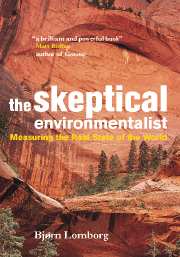Book contents
- Frontmatter
- Contents
- List of figures
- List of tables
- Preface
- Language and measures
- Acknowledgements
- Permissions
- Part I The Litany
- Part II Human welfare
- Part III Can human prosperity continue?
- 8 Are we living on borrowed time?
- 9 Will we have enough food?
- 10 Forests – are we losing them?
- 11 Energy
- 12 Non-energy resources
- 13 Water
- 14 Conclusion to Part III: continued prosperity
- Part IV Pollution: does it undercut human prosperity?
- Part V Tomorrow's problems
- Part VI The Real State of the World
- Notes
- Bibliography
- Index
9 - Will we have enough food?
Published online by Cambridge University Press: 05 March 2013
- Frontmatter
- Contents
- List of figures
- List of tables
- Preface
- Language and measures
- Acknowledgements
- Permissions
- Part I The Litany
- Part II Human welfare
- Part III Can human prosperity continue?
- 8 Are we living on borrowed time?
- 9 Will we have enough food?
- 10 Forests – are we losing them?
- 11 Energy
- 12 Non-energy resources
- 13 Water
- 14 Conclusion to Part III: continued prosperity
- Part IV Pollution: does it undercut human prosperity?
- Part V Tomorrow's problems
- Part VI The Real State of the World
- Notes
- Bibliography
- Index
Summary
Food is perhaps the most important single resource for humanity, since our very existence depends on it. It is a renewable resource, but still a scarce resource, potentially under pressure from the increasing population.
Lester Brown from Worldwatch Institute has throughout the last 30 years of population increase claimed that agricultural production could no longer keep up and that now prices would start increasing. As we have seen in the preceding chapter, this has not happened. In the 1998 edition of The State of the World, Figure 48 was produced as evidence. Most people would probably see a general downwards tendency undermining the previous predictions of crises and price hikes. But instead the data are used to prove that prices are turning and now on their way up:
The long-term decline in the real price of wheat, the world's leading food staple, that has been under way since mid-century may have bottomed out during the 1990s. After dropping to a recent low of $3.97 per bushel in 1993, the price increased in each of the next three years, reaching $5.54 per bushel in 1996, a rise of 39 percent. While future year-to-year price changes will sometimes be down, as may be the case in 1997, this analysis indicates that the long-term trend is likely to be up.
- Type
- Chapter
- Information
- The Skeptical EnvironmentalistMeasuring the Real State of the World, pp. 93 - 109Publisher: Cambridge University PressPrint publication year: 2001



